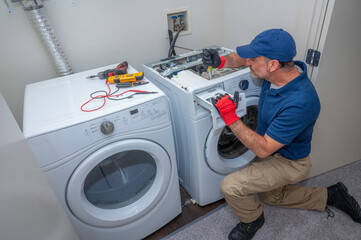Modern households depend on appliances every day, from refrigerators and washing machines to ovens and dishwashers. These essential machines make life easier, but when they break down, they can disrupt daily routines and create costly inconveniences. Appliance repair is an important part of maintaining a functional home, helping to extend the life of your machines, save money, and reduce unnecessary waste. By learning proper maintenance practices and understanding when to call for repairs, homeowners can keep appliances running smoothly for years.

Why Appliance Repair is Important
Appliances are major investments, and replacing them too soon can be expensive. Regular repair and maintenance allow you to:
- Extend Lifespan: Small repairs prevent bigger issues that could shorten the life of your machine.
- Save Money: Repairing is often more affordable than buying a replacement.
- Improve Efficiency: Well-maintained appliances use less energy, lowering utility bills.
- Protect the Environment: Repairing instead of discarding reduces electronic waste.
Common Signs Your Appliance Needs Repair
Knowing the early warning signs of a problem can help you address issues before they escalate. Look out for these red flags:
- Unusual Noises – Grinding, buzzing, or rattling sounds often signal mechanical problems.
- Decreased Performance – If your fridge is not cooling properly or your oven takes longer to heat, repairs may be needed.
- Leaks or Moisture Build-Up – Washing machines, dishwashers, or refrigerators showing leaks need immediate attention.
- Strange Odors – Burning smells, musty odors, or gas-like scents should never be ignored.
- High Energy Bills – Appliances that suddenly consume more energy than usual may have hidden issues.
Appliance Repair for Different Household Machines
Each appliance comes with its own unique maintenance needs. Addressing common problems can help you avoid major breakdowns.
Refrigerator Repair and Maintenance
Refrigerators run 24/7, making them prone to wear and tear. Regularly clean the condenser coils to prevent overheating and check door seals for air leaks. If the fridge isn’t cooling properly, the problem could be with the thermostat, compressor, or motor. Prompt repairs keep food fresh and reduce energy waste.
Washing Machine Care
Washing machines often face issues like drainage problems, excessive vibrations, or water not filling correctly. To prevent damage, avoid overloading the drum, clean the lint filter, and check hoses for leaks. If the machine shakes or produces loud noises, the drum bearings or suspension system may need repair.
Dryer Maintenance
Dryers are convenient but can become fire hazards if not properly maintained. Always clean the lint trap after every use and periodically check the vent for blockages. If clothes remain damp after a cycle or the dryer overheats, the heating element or thermostat may need repair.
Oven and Stove Repair
When an oven fails to heat evenly or a burner doesn’t ignite, it may signal issues with the heating element or igniter. Regularly clean burners and oven interiors to prevent buildup that interferes with performance. If the oven gives off strange odors or cooks food unevenly, repairs are necessary.
Dishwasher Troubleshooting
Dishwashers may stop cleaning effectively due to clogged spray arms, dirty filters, or faulty pumps. Check the drainage system to prevent water pooling at the bottom. If you notice water spots on dishes or strange noises during cycles, a repair might be needed.
Preventive Maintenance Tips for Appliances
Preventive care is the key to avoiding costly repairs. Simple habits can keep your machines functioning longer:
- Clean Regularly: Dust, grease, and dirt buildup can affect performance.
- Follow Manufacturer Instructions: Using appliances as intended prevents strain and damage.
- Avoid Overuse: Overloading washers, dryers, or dishwashers can cause premature wear.
- Check Seals and Filters: Replace worn gaskets and clean filters frequently.
- Schedule Annual Inspections: Professional checks can catch hidden problems early.
When to Repair vs Replace
It’s not always easy to decide whether to repair or replace an appliance. As a general rule, if the repair costs less than half the price of a new appliance and the unit is not too old, repair is the smarter choice. However, if an appliance is nearing the end of its lifespan—such as a refrigerator beyond 12 years or a washing machine over 10 years—it might be more cost-effective to replace it.
Safety Considerations in Appliance Repair
Attempting DIY repairs can sometimes be dangerous, especially with electrical or gas-powered appliances. Always unplug machines before inspecting them, and avoid tampering with wiring unless you have experience. For complex issues such as faulty motors, electrical shorts, or gas leaks, professional repair is strongly recommended.
Benefits of Regular Appliance Repair
Maintaining your appliances offers multiple advantages that impact your household in the long run:
- Consistency in Daily Routines: Functional appliances make chores easier and stress-free.
- Enhanced Safety: Preventing malfunctions reduces fire risks, gas leaks, and water damage.
- Energy Efficiency: Properly working appliances consume less energy and water.
- Sustainable Living: Repairing reduces waste and promotes eco-friendly practices.
Appliance repair is a critical part of keeping a household running smoothly. By learning to recognize signs of trouble, performing regular maintenance, and knowing when to call for repairs, you can extend the life of your machines and avoid unexpected breakdowns. From refrigerators and washing machines to ovens and dishwashers, each appliance requires care and attention. Investing in regular repair and maintenance not only saves money but also ensures efficiency, safety, and peace of mind in your home.
With the right approach, you can keep your appliances in top condition and enjoy their convenience for many years.
